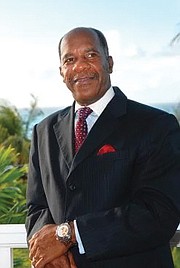Resilience after the hurricane
Religion News Service | 9/27/2019, 6 a.m.

The president of the historically African-American Progressive National Baptist Convention traveled to the Bahamas island of Grand Bahama on Sept. 11 to assess the damage from Hurricane Dorian and came away with stories of damage and determination.
The Rev. Timothy Stewart, a Nassau native and resident, also has fielded calls from clergy of his denomination’s 30-some churches in the Bahamas. The PNBC, with an estimated 2.5 million U.S. and international members, is spearheading an initiative to raise funds and collect supplies for the devastated islands of the country.
Rev. Stewart said the PNBC started its new ministry year on Sept. 1, the day Hurricane Dorian hit the Bahamas with Category 5 force, leaving at least 50 dead and at least 1,300 people missing. The denomination’s new focus is “In Pursuit of Wholeness” — a timely topic, Rev. Stewart said.
“We’re looking at the revitalization of the community,” he said. “I think it seems as though God knew something even before I did.”
Rev. Stewart talked to Religion News Service about what he saw and heard in Dorian’s aftermath, how people in the Bahamas have been affected and how he views the tragedy as an opportunity to put his faith into action.
The interview has been edited for length and clarity.
What struck you most during your visit?
What struck me most probably would have been the tremendous devastation and, simultaneously, the resiliency of the people, the ability of the people to want to recover from that disaster.
I saw many homes where the contents of those homes were basically thrown out of the home. I observed varying degrees of structural damage. And we saw persons doing their best to clean up and to try to determine what would be the next step that they would take.
Well, first, we prayed with them. Secondly, we assured them that we as a convention will assist and do all that we can to help in whatever way we possibly can with regard to bringing relief and bringing assistance at this time.
What are your main plans in relation to that relief and assistance?
I think it will be multifold. One, it would be, obviously, directing and also providing funds so that persons and especially leaders of churches would be assisted with regard to some of the repairs necessary for churches and also for membership homes. And secondly, I think the opportunity to provide supplies, food, nonperishable and other items, water and some basic necessities would be definitely helpful. And then I think thirdly, when the stage requires it, we will try to provide some building material where and when we can, and fourthly, be available for counseling, fellowshipping and ministry opportunities also.
Are churches in the affected areas serving as shelters?
Not many because most of them have been compromised. Even the ones that were serving as shelters, most of them have been compromised.
What have you heard from clergy, pastors, lay people in your denomination or beyond who’ve been affected?
On the island of Abaco I’ve heard from a pastor who literally lost everything, had to evacuate, come to Nassau. He and his family and others are now living under very, very humbling conditions.
But they are grateful for the opportunity to be accommodated where they are: A two-bedroom house is trying to accommodate 12 people. Most of us, we find that difficult to even imagine. And that particular pastor then mentioned to me another pastor who lost his wife. He told me about another pastor who, I think, lost a daughter or two. So we’re talking about some very, very tragic and some very dramatic experiences.
One does one’s best to prayerfully encourage persons and to just assure them that they have our prayers and that they have our support, and anything we can do to assist, we’ll do everything that we can. Nassau was not in the direct path of this storm and was not severely or critically impacted. But we have members in our church who lost loved ones like parents and siblings.
In other words, even though you’re not impacted by the storm or the elements of the storm, you’re certainly impacted by the consequences of the storm.
Are you working with other religious groups in the Bahamas?
I’m working with other religious groups in the Bahamas to a certain extent. But I’m also working with some additional religious groups in the United States.
Are there particular faith groups beyond the Bahamas that have been helpful already?
Yes. The National Baptist Convention USA, Inc.; the National Baptist Convention of America; the Lott Carey Foreign Mission Convention, in addition to our convention.
There was a mention in the Bahamian Baptist Convention (of) some response from the Southern Baptist Convention.
Do you feel your faith is being tested through this difficult tragedy?
I don’t think my faith is being tested through this tragedy. I believe that this tragedy gives me an opportunity to affirm my faith and to apply my faith.
Apply it in any particular way?
Well, first, we see Scriptures in a new light, where you have to appreciate the reality of suffering on the one hand and, secondly, you also begin to acknowledge God’s mercies even in the midst of trying circumstances. The truth of the matter is, had the hurricane hit Nassau instead of where it did hit, then it meant that the entire Bahamas would have been commercially and, for the most part, developmentally crushed because Nassau would be the center of most of what fuels the entire Bahamas.
In spite and in light of what has been a very tragic, very horrendous situation, we are forced to still see the grace of God.






